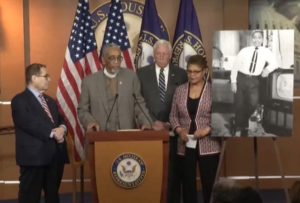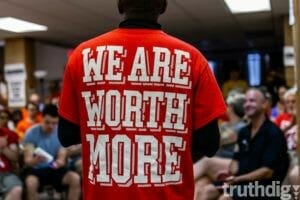Jabari Asim: Overcoming the Stigma
In advance of World AIDS Day, a new anthology confronts the stigma of HIV in the black community.WASHINGTON — Last June, African-American leaders gathered in New York to declare their commitment to vanquishing the AIDS epidemic ravaging many black communities. They lamented the fact that 54 percent of new HIV/AIDS cases diagnosed in the United States involve black patients. They soberly observed that among women, African-Americans account for two-thirds of all new infections. And they released a national report that featured several recommendations, including one that called for “ending the debilitating stigma that fuels the spread of HIV.”
Gil Robertson IV has taken that particular mission to heart. A veteran journalist, he is the editor of “Not in My Family: AIDS in the African-American Community,” a new book aimed at expanding the conversation about the disease among blacks across the country. The anthology includes a range of voices both famous and obscure, all of them addressing some aspect of the epidemic. Contributors range from former Surgeon General Joycelyn Elders to Grammy Award-winning singer Patti LaBelle. I spoke with Robertson as he prepared for activities surrounding World AIDS Day, to be observed Friday (Dec. 1). “If this book could allow us to alleviate some of the fear and demystify it so that the issue can be comprehensively addressed, then I think we’ll have met our goal,” he said.
Robertson told me his interest in writing about AIDS was also personal. “My only sibling came down with this disease 25 years ago,” he said. Robertson’s brother is very much alive and doing well, a fact the author attributes to his family’s compassionate household. “Our family from Day 1 was full of support,” he said. “My parents set the tone that this was a member of our family and we were going to be there for him.”
Some observers close to Robertson were puzzled when his articles on AIDS first began to appear in magazines such as Rap Pages. They wondered why he wasn’t too embarrassed to comment on his brother’s ordeal. “I said, ‘This is my brother. I love this guy. Why would I be ashamed of him?’ “
Robertson’s research for his articles helped him understand the strange attitudes he sometimes encountered. “I learned that our family’s response was very atypical,” he said, alluding to the black community’s much-discussed hesitance to confront AIDS head-on. In Robertson’s view, the reasons behind that reluctance are many and complex. “We have a lot of stuff on our plate. Education issues, obesity, prostate cancer, diabetes. This is just one more thing, and people are overwhelmed. We are a beleaguered people.”
Many critics have pointed an accusing finger at black churches, charging them with failing to meet the challenges that AIDS poses. There is hope for them yet, according to Robertson. “The black church has only just now begun to raise its voice, stressing the need for greater tolerance, greater education and greater understanding. There’s no way the black church couldn’t be a part of this. It’s still the strongest institution in black America.”
With that in mind, Robertson included contributions from prominent church figures such as the Rev. Al Sharpton and the Rev. Calvin Butts, pastor of Harlem’s famed Abyssinian Baptist Church. To get contributions from ordinary citizens, he relied on his contacts in the journalism world. “I wrote a press release and sent it out to colleagues and they posted it, mostly online. BET.com ran an announcement seeking contributors for months. We set up a phone line and a dedicated e-mail for folks to contact us.”
Robertson is proudest of the essays from people most of us are unlikely to have heard of. They include a 15-year-old high school student in the Washington area, and a retired schoolteacher in St. Louis. The teacher’s brief essay, both chilling and heartbreaking, recalls her loving 34-year relationship with a bisexual man who died of AIDS. After his diagnosis, she writes, “The dread of telling our family about our well-kept secret was overwhelming, but because of the nature of this disease, we had to share certain information with our immediate family members in order to protect them.”
The importance of sharing critical information is a theme that runs throughout the book, Robertson said. Equally crucial is the need to reach out to every member of the black community, regardless of economic class, education or background. “This book isn’t just for middle-class black professionals,” said Robertson. “It’s for Pookie, Sheniqua, for all of us. It’s a conversation we all need to be a part of and we all need to feed from.”
Jabari Asim’s e-mail address is [email protected].
Your support is crucial…With an uncertain future and a new administration casting doubt on press freedoms, the danger is clear: The truth is at risk.
Now is the time to give. Your tax-deductible support allows us to dig deeper, delivering fearless investigative reporting and analysis that exposes what’s really happening — without compromise.
Stand with our courageous journalists. Donate today to protect a free press, uphold democracy and unearth untold stories.









You need to be a supporter to comment.
There are currently no responses to this article.
Be the first to respond.